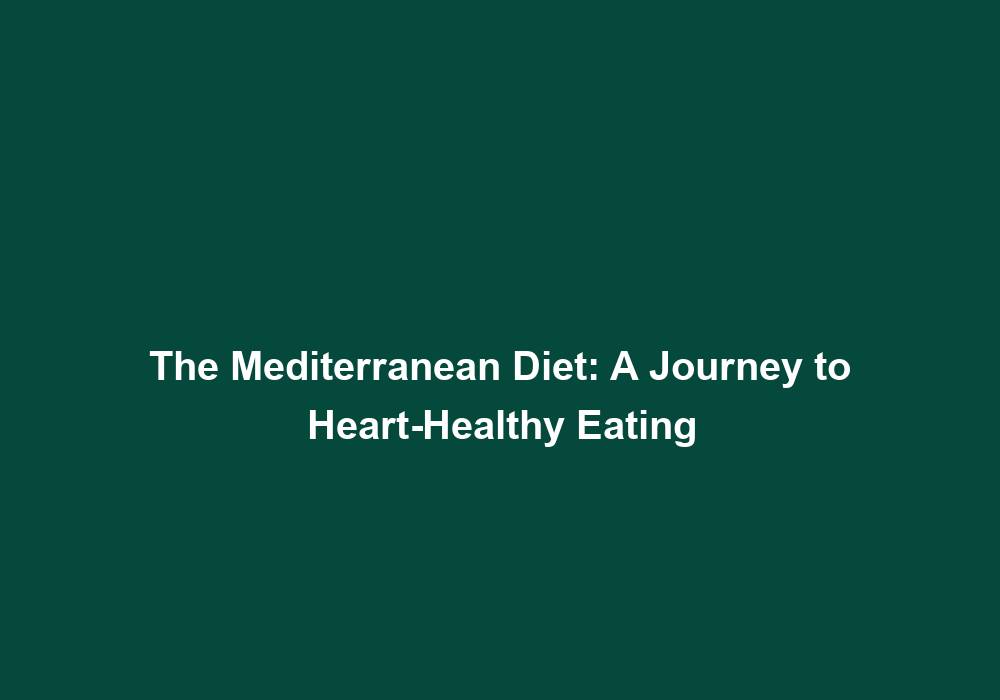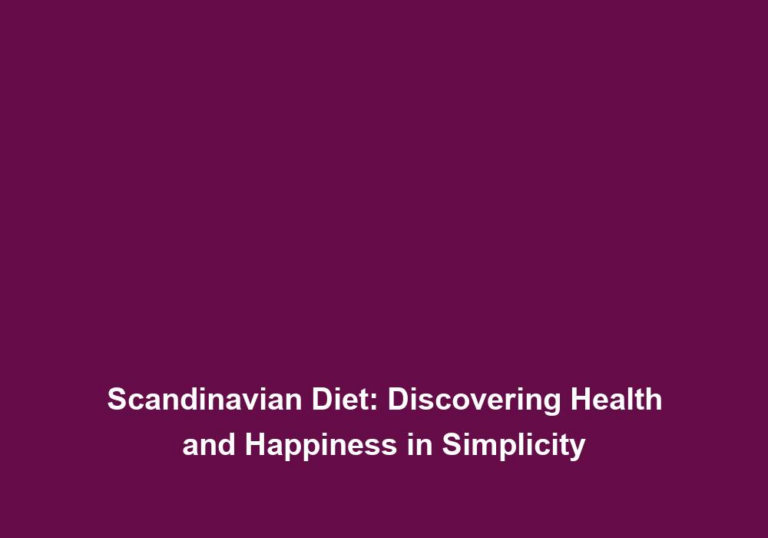The Mediterranean Diet: A Journey to Heart-Healthy Eating
The Mediterranean diet has gained significant popularity in recent years due to its numerous health benefits, particularly its positive impact on heart health. This eating pattern is inspired by the dietary habits of people in countries bordering the Mediterranean Sea, such as Greece, Italy, and Spain.
What is the Mediterranean Diet?
The Mediterranean diet is characterized by an abundance of plant-based foods, such as fruits, vegetables, whole grains, legumes, and nuts. These foods are rich in vitamins, minerals, and fiber, providing essential nutrients for overall health and well-being. By incorporating a wide variety of plant-based foods into your meals, you can ensure a diverse range of nutrients and flavors.
In addition to plant-based foods, the Mediterranean diet includes moderate amounts of fish, poultry, and dairy products. These animal-based foods provide important sources of protein, healthy fats, and minerals like calcium. It is important to choose lean sources of protein, such as fish and poultry, to limit the intake of saturated fats commonly found in fatty meats.
The Mediterranean diet also emphasizes the use of olive oil as the primary source of fat. Olive oil is rich in monounsaturated fats, which have been shown to have numerous health benefits, including reducing the risk of heart disease. It is important to use olive oil in moderation, as it is still a source of calories.
Physical activity is a fundamental component of the Mediterranean lifestyle. Regular exercise, such as brisk walking, cycling, or swimming, not only contributes to weight management but also promotes heart health and overall well-being.
Health Benefits of the Mediterranean Diet
Scientific research has consistently shown that following the Mediterranean diet can have a positive impact on heart health and overall well-being. Let’s explore some of the key benefits in more detail:
-
Reduced Risk of Heart Disease: The Mediterranean diet has been extensively studied and has been associated with a lower risk of heart disease and stroke. The abundance of fruits, vegetables, whole grains, and nuts in this eating pattern helps to promote healthy cholesterol levels, lower blood pressure, and reduce inflammation in the body. These factors contribute to a healthier cardiovascular system and reduce the risk of developing heart-related conditions.
-
Weight Management: The Mediterranean diet is not only beneficial for heart health but also for maintaining a healthy weight. This eating pattern encourages the consumption of nutrient-dense foods while discouraging processed and sugary foods. By focusing on whole, unprocessed foods, you can feel satisfied while consuming fewer calories. Additionally, the high fiber content in plant-based foods helps to promote feelings of fullness and reduces the likelihood of overeating.
-
Antioxidant-rich Foods: The Mediterranean diet is rich in fruits, vegetables, and olive oil, which are excellent sources of antioxidants. Antioxidants are compounds that help protect the body against free radicals and oxidative stress. By including a variety of colorful fruits and vegetables in your diet, you can benefit from a wide range of antioxidants, such as vitamins C and E, beta-carotene, and polyphenols. These compounds have been associated with a reduced risk of chronic diseases, including heart disease, certain cancers, and neurodegenerative disorders.
-
Improved Cognitive Function: Research suggests that the Mediterranean diet may have a protective effect on brain health and reduce the risk of cognitive decline, including conditions like Alzheimer’s disease. The combination of nutrient-dense foods, healthy fats, and antioxidants in this eating pattern may help support brain function and maintain cognitive abilities as you age. Additionally, the Mediterranean diet promotes good blood flow to the brain, which is crucial for optimal cognitive function.
-
Lowered Diabetes Risk: Following the Mediterranean diet has been associated with a lower risk of developing type 2 diabetes. The emphasis on whole grains, legumes, and healthy fats helps regulate blood sugar levels and improve insulin sensitivity. The high fiber content in plant-based foods also contributes to better blood sugar control by slowing down the absorption of glucose into the bloodstream. By adopting the Mediterranean diet, you can significantly reduce the risk of developing diabetes and better manage the condition if already diagnosed.
How to Adopt the Mediterranean Diet
If you’re considering adopting the Mediterranean diet, here are some practical tips to get started:
-
Emphasize Plant-based Foods: Make fruits, vegetables, whole grains, legumes, and nuts the foundation of your meals. Aim to fill half of your plate with colorful and diverse plant foods. Experiment with different types of fruits and vegetables to ensure a wide range of nutrients and flavors. Try incorporating beans and lentils into your meals as a source of plant-based protein and fiber.
-
Choose Healthy Fats: Replace butter and other saturated fats with heart-healthy fats such as olive oil, avocado, and nuts. These fats provide essential nutrients and contribute to the Mediterranean diet’s health benefits. Use olive oil as your primary cooking oil and salad dressing. Add a handful of nuts, such as almonds or walnuts, to your meals or snacks to boost your intake of healthy fats.
-
Eat Fish and Poultry Regularly: Include fish, such as salmon, sardines, and mackerel, in your diet at least twice a week. Fish is an excellent source of omega-3 fatty acids, which are beneficial for heart health. Poultry, such as chicken and turkey, can be included in moderation as a lean source of protein. Be mindful of portion sizes and choose cooking methods that minimize the use of added fats.
-
Limit Red Meat and Processed Foods: Reducing the consumption of red meat and processed foods is essential in the Mediterranean diet. These foods are often high in saturated fats, sodium, and additives that can increase the risk of heart disease and other health problems. Instead, opt for lean protein sources, such as fish, poultry, and plant-based proteins like legumes and tofu. When choosing processed foods, look for options with minimal ingredients and additives.
-
Enjoy Dairy in Moderation: Opt for low-fat dairy products such as Greek yogurt and cheese in moderate amounts. These provide calcium and other essential nutrients while keeping saturated fat intake in check. If you prefer plant-based alternatives, choose unsweetened varieties fortified with calcium and vitamin D. Remember to monitor portion sizes to ensure a balanced intake of dairy products.
-
Herbs and Spices: Enhance the flavor of your dishes with herbs and spices instead of relying on salt. Herbs and spices not only add depth to your meals but also offer their unique health benefits. For example, garlic and turmeric have anti-inflammatory properties, while cinnamon may help regulate blood sugar levels. Experiment with different herbs and spices to discover new flavors and reap their potential health benefits.
-
Stay Active: Regular physical activity is an integral part of the Mediterranean lifestyle. Engage in activities you enjoy, such as walking, cycling, or swimming, for at least 30 minutes most days of the week. Physical activity not only supports weight management but also strengthens the cardiovascular system and improves overall fitness. Find ways to incorporate movement into your daily routine, such as taking the stairs instead of the elevator or going for a walk during your lunch break.
Conclusion
The Mediterranean diet offers a delicious and heart-healthy approach to eating. Its emphasis on plant-based foods, healthy fats, and moderate portions of fish and poultry contribute to numerous health benefits. By adopting this dietary pattern, you can embark on a journey towards improved heart health and overall well-being. Remember to consult with a healthcare professional before making any significant changes to your diet.







